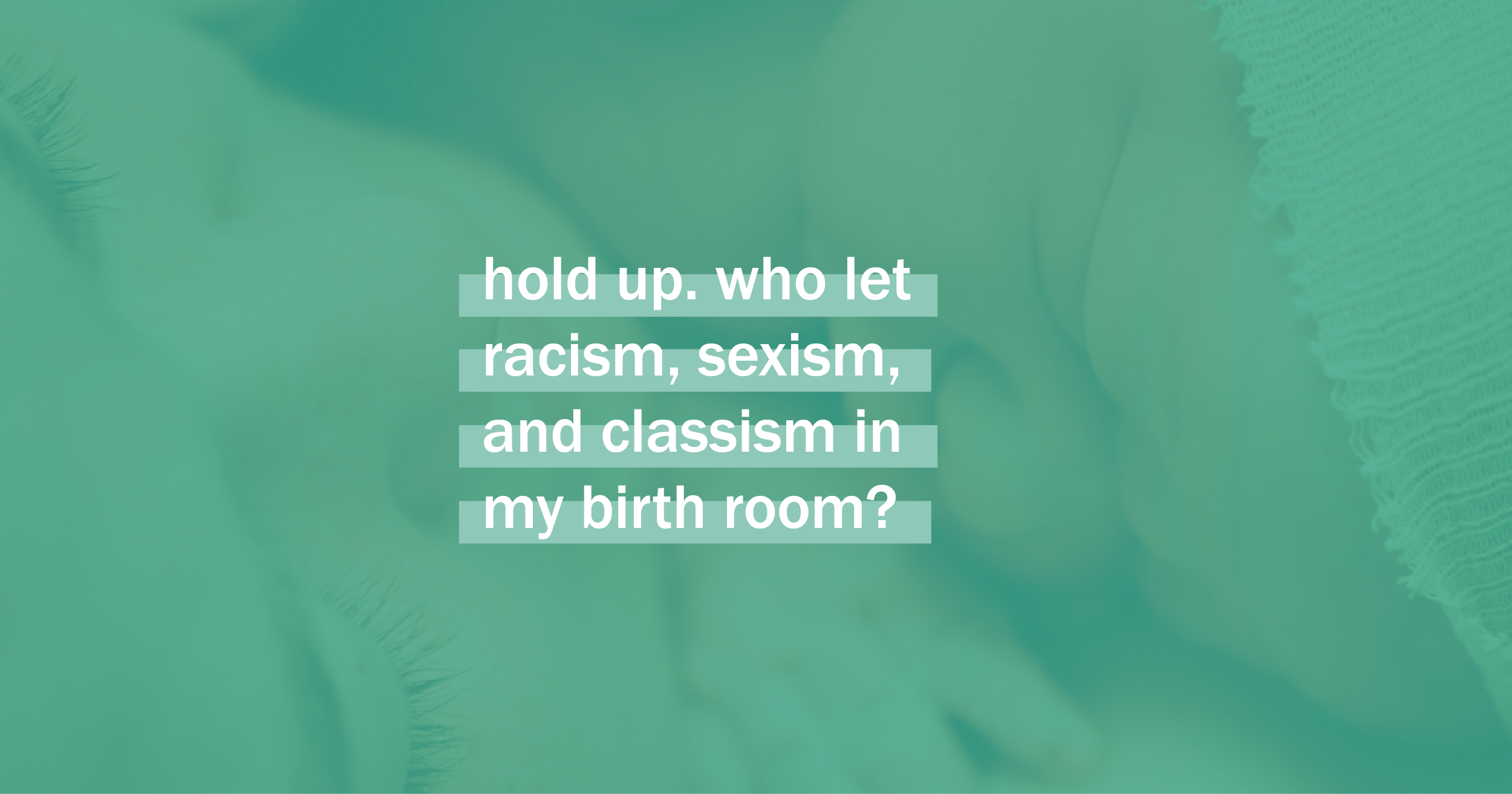Hold Up. Who Let Racism, Sexism, and Classism In My Birth Room?
Photo by Jade Chiu
Today's post comes to you from Everyday Birth, a new magazine I've launched through The Educated Birth, about pregnancy, birth, and parenthood created for folks from many life experiences. View the original post here.
Racism, sexism, and classism can be found pretty much everywhere. Whether you're worried about facing obstacles due to age, race, gender, sexuality, language, or anything at all, there are ways that you can address this possibility head on to remove its power from your birth. You know what they say, the best offense is a good defense. Here are some ways you can proactively prepare to avoid, block, and confront discriminatory experiences we know happen in some birth rooms.
Spend Time Learning and Saying What You Want
If you've been to any birth classes, interviewed any doulas, or searched the internet enough, you've probably heard of these things called birth plans, or birth goals, or birth preferences. They're all the same: an organized way for you to say to your doctor, "This is what I do and do not want for my birth."
Since labor is like a box of chocolates— "you never know what you're gonna get" — birth plans can't tell us what we can expect from labor — but when we talk about them with care providers and hospitals, they can tell us a lot about what we can expect from them.
So invest time in attending a birth class in your area that can teach you (and your partner if possible) more about your options. Then take that information and make sure it matches up to the place and people you're surrounding yourself with at your birth.
Interview Your Care Provider
How did you find your care provider? Recommendation? Internet search? Are you in their office because it's the closest, the most familiar from passing it often, or it's the first one you visited and seems just fine?
When it comes to your care provider, remember you're hiring them. If you have private insurance, your insurance payments are going toward their care for you. If you're on Medicaid – same deal – that care provider is still getting paid for their service, and you're the direct link between the two.
So write down your birth preferences and talk them over one by one with the care providers you want to consider. Then take notes on them. How do they respond to your desires? Do they listen fully or interrupt? Do they support and show comfort with your choices or do they seem worried, agitated, or a little too amused? Do they try to talk to you out of things, or ask questions to understand what you're looking for? The way a care provider treats you in a meeting will probably be similar to the way they treat you when you're in labor, and feeling much more vulnerable.
Have an Ally Present with You at Your Birth
Birth doulas are professionally trained to support pregnant people before, during, and for a short time after birth (then postpartum doulas step in). If you are able to hire a birth doula or find a low-cost or volunteer one through a community doula program you and your partner will have someone who'll get to know you, walk you through your options, and be with you during labor to support and empower you if any red or yellow flags arise.
Talk to your doula about how you want to address these potential situations. For example, if a hospital staff person repeatedly uses incorrect pronouns during labor, would you prefer to address it, to have your partner address it or would you ask your doula to do so? Or if English is a second language for you or your partner, and a nurse appears agitated by the extra time it takes to get information,
do you want your doula to quietly support you through the unpleasant moment passing, or to request a new nurse for you even if it makes that moment take longer?
Talking through some of these scenarios, while not as fun as say, practicing massage as a comfort measure, may help quell some of the nerves that may exist around the uncertainty of what you could do if A, B, or C situation happened. And you can also come up with a game plan to reground your mind and body, so you can refocus on the beautiful work of bringing new life into this world if a discriminatory presence disturbs your birth.
Ask a Lot of Questions
If someone in your birth space is giving suggestions or directions that feel biased, or making statements that you feel infringe upon your right to choices, start asking questions. You might ask, "I understand [some issue] is a concern for some parents, is there something you're seeing that makes you worry about it for me?" Or, "I understand [that intervention] is one option. What are some of my others?" Or, "I know I may want [another intervention] later. Can I wait a few more contractions before deciding?"
If the issue is more that you feel the folks in your birth space are not communicating openly, you might ask, "Can I have an update on how labor looks to be progressing?" Or say, "I feel [this way] right now and when I got here I felt [that way]. Is there anything I should know about what may happen next?"
We know that discrimination in the healthcare setting often comes from subconscious biases that medical professionals may not even be aware they are acting out. While this does not excuse these behaviors, it does give us some tools to confront them. Asking questions can be a great way to gently redirect a medical providers' biased reaction to the actual situation in front them.
Remember You're in Charge
Bottom line, know and regularly remind yourself throughout your pregnancy that you are the keeper of your body and your baby. You can ask anyone in your birth room to leave and/or be replaced. You can change hospitals or doctors if they cannot properly support you and your birth. And you can decline medically unnecessary suggestions to changing how to labor.
And Hold Professionals Accountable
If you have a discriminatory experience with a birth professional, there's a good chance, unfortunately, that you're not the only one. If the situation is slight enough and you feel comfortable enough to talk to the provider yourself, that can be a good option.
Otherwise, talk to someone who can document the situation and hold them accountable. For their own professional development, someone around them should know they have some growing to do, and if they can't get past their biases, someone should be able to prevent their behavior from harming other families.










DYK 60-75% of body/breastfeeding parents bedshare — EVEN when they don’t plan to? Let’s talk about safe sleep!